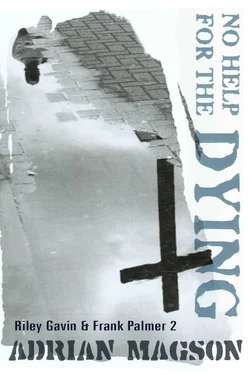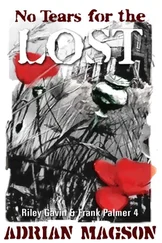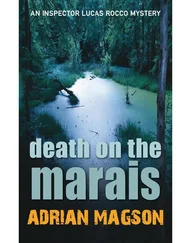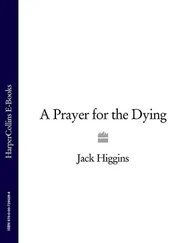Adrian Magson - No Help For The Dying
Здесь есть возможность читать онлайн «Adrian Magson - No Help For The Dying» весь текст электронной книги совершенно бесплатно (целиком полную версию без сокращений). В некоторых случаях можно слушать аудио, скачать через торрент в формате fb2 и присутствует краткое содержание. Год выпуска: 2012, Жанр: Триллер, на английском языке. Описание произведения, (предисловие) а так же отзывы посетителей доступны на портале библиотеки ЛибКат.
- Название:No Help For The Dying
- Автор:
- Жанр:
- Год:2012
- ISBN:нет данных
- Рейтинг книги:4 / 5. Голосов: 1
-
Избранное:Добавить в избранное
- Отзывы:
-
Ваша оценка:
- 80
- 1
- 2
- 3
- 4
- 5
No Help For The Dying: краткое содержание, описание и аннотация
Предлагаем к чтению аннотацию, описание, краткое содержание или предисловие (зависит от того, что написал сам автор книги «No Help For The Dying»). Если вы не нашли необходимую информацию о книге — напишите в комментариях, мы постараемся отыскать её.
No Help For The Dying — читать онлайн бесплатно полную книгу (весь текст) целиком
Ниже представлен текст книги, разбитый по страницам. Система сохранения места последней прочитанной страницы, позволяет с удобством читать онлайн бесплатно книгу «No Help For The Dying», без необходимости каждый раз заново искать на чём Вы остановились. Поставьте закладку, и сможете в любой момент перейти на страницу, на которой закончили чтение.
Интервал:
Закладка:
The atmosphere in the house had been heavy and sombre, not much helped, she now recalled, by the dark décor — especially in Katie’s room — and the lingering smell of incense. It hadn’t meant much at the time because of the circumstances, but now the new occupant of the house had reminded her, she found herself reliving those first impressions. Odd, really, because neither John nor Susan Pyle had seemed the sort of people to use incense, nor had they come across as naturally sombre in their everyday lives, in spite of the tragedy which had suddenly overshadowed them.
And now it looked as if it had called yet again, with the discovery of Katie’s body.
‘How long is it since you last saw Susan?’ The study door had opened without a sound, and Mrs Francis’s voice dragged Riley sharply back to the present. The older woman was already juggling cups and saucers on a side table, and she paused until Riley nodded, before adding milk to a cup.
‘Nine years — maybe ten.’ Riley wondered to what extent Katie’s mother would have changed in ten years.
‘Susan’s condition,’ Mrs Francis began carefully, as if reading her thoughts, ‘has not been good just recently. I know something of the history, but she has never been too keen to talk about the circumstances surrounding her daughter. I just wanted to clarify that.’
‘I understand. How long has she been here?’
‘She bought the house about four years ago, following the death of her husband. I was taken on as a residential companion a year later.’ She looked at Riley over her cup and a flicker of distaste touched her face. ‘They prefer the term ‘carer’ these days. Such a horrible word in my view. It sounds so false. My role is — was — more as a companion than anything.’
‘You’ve done this before?’
‘Oh, yes. I’m a qualified SRN, so it usually involves a degree of nursing as well as companionship. But some people are better served by having another person about the place.’
‘Like Susan, you mean?’
‘Yes. She told me a little about Katie, but it was very difficult for her. It must have been a sad business… but I suppose you’d know more about that. In spite of that she’s been happy here, Miss Gavin. Very happy… until recently. She has had cancer for some years, you see. We thought it was in remission, but then she went downhill very suddenly.’
‘I’m sorry.’
‘No need, my dear. It’s part of life. I do know she never got over losing Katie.’ She stared out of the window. ‘In a way, it was as if she tried walking away from the past instead, hiking along the coast day after day. I never knew anyone who could walk the way she did. I couldn’t keep up, so I stopped going. After a while she seemed to take a better hold on things; she settled and seemed to find some peace. Then one day about three months back, she was out walking on the shore and got caught out in a storm. She fell and broke her ankle, but managed to make her way up the beach. She began to get well, then about four weeks ago something upset her terribly and she suddenly got worse.’
‘What happened?’
Mrs Francis took a sudden deep breath, and flicked an imaginary crumb from her overall before folding her hands into her lap. ‘She was home here, doing really well. Still weak, of course, but improving. The consultant at the hospital said she simply needed plenty of rest, although, to be honest, I think we all knew it couldn’t go on indefinitely. Then, one day when I was out, two men arrived.’
Riley felt a chill of apprehension. ‘What men?’
‘Susan described one as thin, as if he didn’t eat much. And very hard-faced. Dressed in dark clothing, like those characters in the movies. Like… what was it, Matrix or something. We watched it on video once. The other man stayed in the car.’
‘What did this man want?’
‘He demanded to know where Katie was.’
Chapter 20
‘Never seen her.’ The man in the stained army surplus coat shook his head at Palmer and turned away, eyes already slipping into half-focus. He was as thin as a slate and just as grey, with an unnatural greasy sheen to his skin, and didn’t react when Palmer slipped some coins into his hand. Yet another refusal in a long line of similar responses.
Palmer had been at it for two hours now, trawling the hidden corners and niches on the fringes of Oxford Street, and was fast running out of options. The rush hour was just building, and few of the street people who had surfaced this early had given the photo of Angelina a glance, shutting off further questions with a sour look or a shake of the head. Whether out of indifference or ignorance it was hard to tell. The older ones merely retreated behind blank faces, immune to involvement. They had their own problems. The young ones were quick to ask for money when he approached, but equally quick to melt away when he mentioned missing kids. Not their business; best not get involved.
Palmer continued on through the underpass, and wondered how Riley was getting on. He checked his watch. Wherever she was, it had to be more fragrant than this place. The rumble of traffic around Marble Arch sounded overhead and his footsteps echoed off the curved walls. He stepped over discarded sheets of stained cardboard, crumpled coffee mugs and a torn blanket that were the previous night’s debris, and saw a needle glistening in the gloom. Close by, a square of scorched silver foil fluttered away on the wind, and he felt a deep sadness at the squalid conditions existing barely yards away from the prosperity of the shops above. The long tunnel smelled of damp, carrying with it the sharp tang of urine and hopelessness, and he found himself holding his breath as he approached the exit stairs to the west side of Park Lane.
On the pavement above, he breathed fresher air and hailed a taxi, giving directions for the embankment south of the river. One youth earlier, tempted by the promise of cash, had muttered a vague comment about the area behind Waterloo station. Before Palmer could press him for more details, another man had appeared and the youth had clammed up and moved away. Palmer had stored the information and left. He wasn’t offended by their suspicions; few people wished them well, and it was no surprise if they believed that anyone who came asking questions rarely had the best of intentions.
He took Angel’s photo from his pocket and studied it again, wondering if she was still at large or had found shelter of some kind. Her background would have ill-prepared her for the harshness and brutality of life on the streets, while her age, clothes and skin would have marked her out for special attention among the monsters prowling the shadows, always on the lookout for fresh meat.
There were hundreds of places where street kids congregated. Covering them all would take weeks, always assuming he could keep up with the ever-shifting population. But a hint was all he needed to pick up a trail — if it still existed. At least it would be somewhere to start, rather than wandering aimlessly in the hope of a chance sighting.
He had the taxi drop him off outside County Hall, and made his way on foot to the area east of the station, where the smells of the river were sharp and pungent on the breeze. He saw no signs of youths on the way, none of the customary shuffling figures and wary, pale faces turned towards him; no listless bundles squeezed into grubby corners. Perhaps they were busy up west, where the pickings were sometimes easier.
He reached the river and scanned the surrounding streets. It was as if the place had been evacuated, save for a couple of Japanese tourists. It was colder here, the early wind lifting off the water and bringing with it a bone-slicing chill that added nothing to the grey concrete and blank windows.
Читать дальшеИнтервал:
Закладка:
Похожие книги на «No Help For The Dying»
Представляем Вашему вниманию похожие книги на «No Help For The Dying» списком для выбора. Мы отобрали схожую по названию и смыслу литературу в надежде предоставить читателям больше вариантов отыскать новые, интересные, ещё непрочитанные произведения.
Обсуждение, отзывы о книге «No Help For The Dying» и просто собственные мнения читателей. Оставьте ваши комментарии, напишите, что Вы думаете о произведении, его смысле или главных героях. Укажите что конкретно понравилось, а что нет, и почему Вы так считаете.












